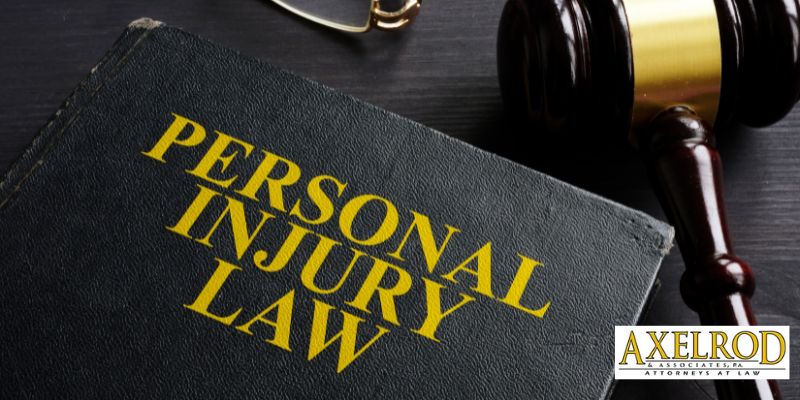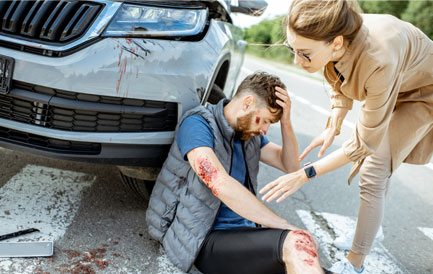4701 Oleander Drive, Suite A
Myrtle Beach, SC 29577
4701 Oleander Drive, Suite A
Myrtle Beach, SC 29577
Conway Personal Injury Lawyer
Conway, SC Personal Injury Attorney
Conway, SC, like any other city, is not immune to personal injuries that can result from accidents, negligence, or intentional acts. Personal injuries can significantly impact a person’s life, causing physical, emotional, and financial harm. From slip and fall accidents to car crashes, workplace injuries to medical malpractice, personal injuries can take many forms and happen to anyone, regardless of age, gender, or background.
A personal injury in Conway, SC, can be a challenging and stressful experience for the victim and their family. Lost wages, medical bills, and ongoing treatment and rehabilitation can add up quickly, leaving the victim struggling to make ends meet. Therefore, seeking legal advice if you have been injured due to someone else’s negligence can help ensure you receive fair compensation for your damages and losses.
At Axelrod & Associates, we have been representing clients in Conway, SC, who have been injured due to the negligence of another for many years. We understand how difficult it can be for victims to navigate the legal system and seek fair compensation for their injuries. For this reason, we take pride in providing quality legal representation and aggressive advocacy for our clients. We are committed to helping you understand your legal rights and options and will fight hard to protect your best interests.
When you come to Axelrod & Associates, you can be sure that our experienced and compassionate personal injury lawyers will do everything possible to get you the best outcome for your case. We will provide a free, confidential consultation to discuss the specifics of your situation and how we can help. Let’s get started on your road to recovery.

What Are the Most Common Types of Personal Injury Cases in Conway?
Several types of personal injury cases can occur in Conway, SC. Some of the most common types of personal injury cases include the following:
- Car Accidents: Car, motorcycle, and truck accidents are a prevalent type of personal injury case in Conway, SC. These accidents can happen due to various factors, such as driver negligence, drunk driving, speeding, and distracted driving. For example, if a driver is texting while driving and causes an accident, they can be held liable for any resulting injuries or damages. Similarly, if a driver is speeding and crashes into another car, they can be held responsible for any resulting harm.
- Slip and Fall Accidents: These accidents are another common type of personal injury case in Conway, SC. Slip-and-Fall accidents can happen on public and private properties. They can be caused by several factors, such as highly wet or slippery floors, uneven or broken sidewalks, and inadequate lighting. For example, if someone slips and falls on a wet floor in a grocery store due to a lack of warning signs, the grocery store can be held responsible for any resulting injuries or damages.
- Medical Malpractice: This type of professional injury occurs when a licensed healthcare professional fails to meet the expected standard of care. This failure can result in an avoidable injury or harm to the patient, including misdiagnosis and surgical and medication errors. For example, if a surgeon performs a surgery incorrectly and causes further injury to the patient, the surgeon and the hospital can be held liable for any resulting harm.
- Dog Bites: Dog bites can cause severe injuries, including cuts, lacerations, and infections. Dog owners can be held liable for injuries caused by their pets under certain circumstances, such as if the dog has a history of aggression or if the owner was negligent in controlling the dog. For example, if a dog owner fails to restrain their dog properly, and someone is bitten, the owner can be held for any injuries or damages the dog bite causes.
- Product Liability: Product liability cases can occur when a product is defective or dangerous, causing injury or harm to the consumer. This includes defective car parts, dangerous drugs, and medical devices. For example, if a person is injured by a car with a defective airbag, the manufacturer and the airbag can be held responsible for any resulting harm.
- Workplace Injuries: Workplace injuries can happen in any job or industry, and employers are responsible for providing a safe working environment for their employees. Workplace injuries can occur for various reasons, including unsafe working conditions, lack of training, defective equipment, or negligence by a coworker. For example, if an employee slips and falls on a wet floor in a workplace due to inadequate warning signs, the employer can be held liable for any resulting injuries.
- Nursing Home Abuse: Unfortunately, some nursing home residents can be subjected to physical, emotional, or financial abuse or neglect by caregivers. This can include inadequate medical care, lack of supervision, medication errors, or intentional abuse. For example, if a nursing home resident is neglected and develops bedsores due to lack of care, the nursing home can be held liable for any resulting injuries or damages.
What Evidence Can Prove Blame in a Personal Injury Case?
When it comes to personal injury cases, the evidence is critical in proving who is at fault or liable for the injuries and damages sustained by the victim. Here are some types of evidence that can be used to prove blame in a personal injury case:
- Physical Evidence: Physical evidence such as damaged vehicles, broken equipment, and other physical items can be used to determine what happened during the accident. For example, skid marks on the road indicate that a driver was speeding, while a broken machine can suggest that it was defective and caused injury.
- Eyewitness Testimony: Eyewitnesses can provide crucial information about the accident and what they saw happen. Their accounts can help corroborate the victim’s version of events and provide details about the accident that the victim may have missed.
- Medical Records: Medical records can provide evidence of the injuries sustained by the victim and the extent of those injuries. Medical records can include X-rays, MRIs, medical reports, and bills that detail the treatment and costs associated with the injury.
- Expert Testimony: Experts such as accident reconstruction specialists, medical professionals, and engineers can testify on the accident’s technical matters. Their expertise can help explain how the accident occurred and provide insights into the nature and extent of the victim’s injuries.
- Photographs and Videos: Photographs and videos can provide visual evidence of the accident scene, the injuries sustained, and the damage caused. For example, pictures of a broken step that caused a slip and fall accident can help prove that the property owner was negligent in maintaining their property.
- Police Reports: Police reports can be used to document the accident, provide details of the parties involved, and identify any witnesses. The report can also detail any citations issued, which can help establish negligence or fault.
- Social Media Posts: Social media posts, such as photos and messages, can provide evidence that can be used in personal injury cases. For example, if a person posts a photo of themselves engaging in physical activity while claiming to be injured, it can be used to challenge their claim.
- Written Statements: Written statements from the parties involved, witnesses, or even the defendant’s employer can provide a record of what happened during the accident. These statements can be used to establish facts and support the victim’s version of events.
- Cell Phone Records: Cell phone records can be used to prove distracted driving or other negligent behavior. An attorney could use cell phone records to establish negligence if the defendant was on their phone during the accident.
Collecting and reviewing the evidence is integral to any personal injury case. Your attorney can help you collect and preserve the evidence needed to prove blame in your case. Making any mistakes in the legal collection and preservation of evidence can be costly and weaken the strength of your case. It must be legally obtained and handled carefully to ensure it is admissible in court. Be sure to discuss your legal options with experienced Conway personal injury attorneys before taking action. They can help you understand the laws and the legal process and ensure your rights are protected throughout the case. Sensible decisions and effective advocacy can make all the difference in recovering the compensation you deserve.
What Is the Process of a Personal Injury Case in Conway, South Carolina?
- Consultation with an Attorney: The first step in a personal injury case is to consult with an experienced personal injury attorney in Conway, SC. The attorney will evaluate the case details, including the accident’s circumstances, the victim’s injuries, and the potential legal options.
- Investigation and Evidence Gathering: Once the attorney has been retained, they will investigate the accident and gather evidence to support the victim’s claim. This may include conducting interviews with witnesses, reviewing medical records, obtaining police reports, and analyzing other relevant documents.
- Demand Letter: After gathering the necessary evidence, the attorney will draft a demand letter that outlines the victim’s injuries, the impact of the accident on their life, and the compensation being sought. The demand letter is usually sent to the defendant or their insurance company and serves as an initial offer for settlement.
- Negotiations and Settlement: The defendant or their insurance company will review the demand letter and respond with an offer of their own. The attorney and the victim will review the offer and negotiate a fair settlement covering all the damages the victim sustained. Negotiations can be a lengthy process and may involve multiple rounds of offers and counteroffers before a settlement is reached.
- Filing a Lawsuit: If negotiations fail, the attorney may decide to file a lawsuit on the victim’s behalf. This typically involves filing a complaint with the court and serving the defendant with a copy of the complaint. The defendant will then have a chance to respond to the complaint.
- Discovery: During the discovery phase, both parties will exchange information and evidence related to the case. This may include depositions, interrogatories, and requests for documents. The purpose of discovery is to enable both parties to obtain relevant information and evidence and to prepare for trial.
- Mediation or Arbitration: In some cases, mediation or arbitration can resolve the case before it goes to trial. A neutral third party will help the parties negotiate a settlement during mediation or arbitration. Mediation or arbitration can be less formal and less costly than going to trial and can often lead to a quicker resolution of the case.
- Trial: If the case proceeds to trial, both parties will present their evidence and arguments to a judge and jury. The trial typically involves several stages, including opening statements, examination and cross-examination of witnesses, presentation of evidence, and closing arguments. The judge and jury will then determine liability and damages based on the evidence presented.
- Appeals: If either party is not satisfied with the trial’s outcome, they may appeal the decision to a higher court. Appeals can be lengthy and expensive and typically involve a review of the trial record to determine if any legal errors were made.
Any personal injury case in Conway, SC, can be a long and complicated process. Still, with the help of experienced legal counsel, victims can expedite the process to avoid unnecessary delays. An experienced personal injury attorney is your best advocate to resolve your case fairly.
Best Practice Questions To Ask Before Hiring a Personal Injury Attorney
- What experience do you have in handling personal injury cases?
- What is your approach to managing my case?
- What is your fee structure?
- What is your communication policy?
- How will you keep me informed of my case’s progress?
- Do you have trial experience?
- Can you provide references from past clients?
- How long do you expect my case to take?
- What is your assessment of my case?
By asking these questions, you can better understand the attorney’s experience, communication, approach, and fees and decide which personal injury attorney to hire.
FAQs About Conway, SC Personal Injury Laws
Can I Sue for Pain and Suffering in South Carolina, and How Is It Calculated?
In South Carolina, you may be able to sue for pain and suffering as part of your personal injury claim. Pain and suffering damages are calculated based on the severity of your injuries, the length of your recovery, and the impact of your injuries on your daily life. An experienced personal injury attorney can help you understand how pain and suffering damages may apply to your case.
What Percentage Do Most Personal Injury Lawyers Take, and How Is Their Fee Calculated?
Most personal injury lawyers work on a contingency fee basis, which means they only get paid if you receive a settlement or win your case in court. The standard contingency fee is typically one-third of the total settlement or judgment amount, but this can vary based on the attorney and the specifics of your case.
What if I Can’t Afford a Lawyer for My Personal Injury Case?
If you cannot afford a lawyer for your personal injury case, options may be available. Some personal injury attorneys work pro bono or offer reduced-fee services for low-income clients. You can also find legal aid organizations or other resources to help you find affordable legal representation.
Do I Need To Hire a Personal Injury Lawyer for My Case, or Can I Handle It Myself?
While you are not required to hire a personal injury lawyer for your case, it is often in your best interest to do so. Personal injury cases can be complex, and an experienced attorney can help you navigate the legal process, gather evidence, and negotiate a fair settlement. Without an attorney, you may be at a disadvantage when dealing with insurance companies or defending against counterclaims.
How Much Time Do I Have To File a Personal Injury Claim in South Carolina?
In South Carolina, you generally have three years from the date of the accident to file a personal injury claim. This time limit, known as the statute of limitations, applies to most personal injury cases. If you wait too long to file your claim, you may lose your right to seek compensation for your injuries and damages. This would be detrimental to your claim and personal financial well-being, as it could leave you liable for the costs of your injuries. You never want to face this, so it’s essential to take action as soon as possible after the accident. If you have any roadblocks that might be preventing you from filing your claim, get in touch with a legal professional to discuss your options.
Contact Axelrod & Associates Today
Personal injuries can be confusing, and the legal process can be overwhelming. If you’ve been injured in an accident due to someone else’s negligence, seek experienced legal representation from Axelrod & Associates. For years we have held insurance companies and negligent parties accountable for the harm they have caused. Our experienced personal injury attorneys will fight tirelessly to ensure you receive full compensation for your injuries. Contact us today for a consultation. We are eager to get started on your case.
Need help? Contact Axelrod & Associates, P.A.

Request your
Consultation
The fields marked with * are mandatory.






